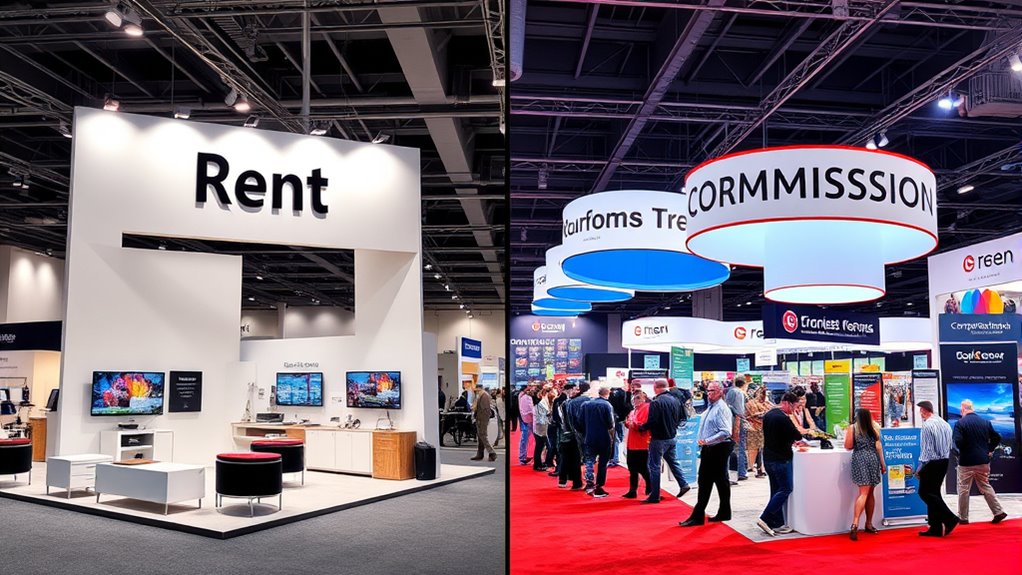Choosing between booth rent and commission depends on your priorities. With booth rent, you gain more control over pricing, services, and branding but take on higher financial risk if clients are scarce. Commission offers more predictable income and less upfront expense but restricts your independence and control. Your experience level and goals will help you decide which fits best. Explore further to discover how each model impacts your earnings and growth potential.
Key Takeaways
- Booth rent offers greater independence and control over pricing and scheduling, suitable for experienced stylists building a personal brand.
- Commission models provide predictable income with lower financial risk, ideal for newcomers or those seeking stability.
- Booth rent can maximize earnings with client growth but increases financial exposure, while commissions reduce personal expenses and risk.
- The choice depends on individual goals: independence and growth versus stability and predictability.
- Environment customization and professional identity are easier with booth rent, whereas commission models often follow salon policies.

Choosing between booth rent and commission-based pay is a crucial decision for salon owners and beauty professionals. Your choice impacts not only your income but also the overall salon profitability and your level of stylist independence. When you opt for booth rent, you take on a more entrepreneurial role, paying a fixed fee for your space regardless of how much you earn. This setup allows you to set your own prices, choose your services, and manage your schedule, giving you greater control over your career. It can boost your stylist independence by enabling you to build your brand and client base without interference from salon management. However, this independence comes with risks; if you don’t bring in enough clients, your income can suffer, and you’ll need to cover expenses like rent, supplies, and marketing.
On the other hand, a commission-based model ties your earnings directly to your sales. Typically, you’ll work under the salon’s umbrella, earning a percentage on each service you provide. This structure can enhance salon profitability because the salon benefits from your sales, and you don’t bear the full financial burden of running your own space. It also offers a level of security—if business slows down, your pay doesn’t disappear entirely, though it might decrease. Yet, this model can limit your stylist independence, as you’ll often need to follow the salon’s pricing structure and policies. Your ability to customize your services or build your brand might be constrained by the salon’s rules, which could impact your long-term growth and satisfaction.
Your decision should depend on your personal goals and working style. If you value independence and are confident in your ability to attract clients, booth rent could be the better fit. It allows you to develop your unique style and build a personal brand that can lead to higher earnings as your reputation grows. Conversely, if you prefer a more predictable income and less financial risk, a commission-based setup might suit you better, especially when starting out or working in a highly competitive market. Keep in mind that each model influences your overall salon profitability differently. Booth rent can maximize your earnings if you succeed, but it also increases financial risk. Commission-based pay offers stability and shared success, but it might limit your earning potential and professional freedom. Additionally, the type of planters used in your workspace can influence your environment and productivity. Ultimately, understanding your strengths, financial situation, and professional ambitions will help you choose the structure that best supports your growth and satisfaction in the beauty industry.
Frequently Asked Questions
How Does Booth Rent Impact Income Stability for Stylists?
Booth rent impacts your income stability by creating income fluctuation, as your earnings depend on your client volume and sales. With fixed rent, you must plan financially for slow periods, making consistent income harder to achieve. To manage this, focus on effective financial planning, saving during busy times, and diversifying your services. This approach helps you stay more stable despite the inherent income fluctuations of booth rent.
What Are the Tax Implications of Booth Rent Versus Commission?
Think of your income like a river flowing to a dam—tax implications shape how much water you can use. With booth rent, you report your income and claim tax deductions for expenses like supplies and rent, giving you control over income reporting. For commission, your earnings are often combined with employer wages, affecting tax deductions. Understand these differences to manage your taxes effectively and maximize your earnings.
Can a Stylist Switch Between Booth Rent and Commission Easily?
Yes, you can switch between booth rent and commission, but it’s not always seamless. You’ll need to contemplate scheduling flexibility, as your hours and client bookings might change. Also, think about equipment responsibilities—you may need to provide or maintain your tools when switching. Check with your salon on policies, and plan for any tax or contractual adjustments to facilitate a smooth transition.
How Do Client Retention Rates Compare Under Each Model?
Ever wonder how client loyalty trends differ under each model? You’ll find that commission setups often foster stronger client retention because stylists tend to prioritize personalized, ongoing relationships. In booth rent models, client loyalty can vary more, as stylists might focus on volume or quick appointments. Ultimately, your ability to build trust and consistency impacts retention more than the payment structure itself, regardless of the model you choose.
What Legal Considerations Should Be Reviewed for Each Arrangement?
You should review legal compliance and lease agreements for each arrangement. For booth rent, make certain your lease clearly states terms, rent amount, and duration to prevent misunderstandings. For commission-based setups, verify your contracts specify commission rates, payment schedules, and termination clauses. Always consult a legal professional to confirm your agreements meet local laws, protect your interests, and avoid potential disputes or liabilities under both models.
Conclusion
Choosing between booth rent and commission is like deciding whether to tame a wild stallion or ride a lightning bolt—you’ll face wild challenges and thrilling rewards. Each option has its own universe of pros and cons, demanding you weigh your style, income goals, and risk tolerance. Remember, the right choice could transform your career from a mere spark to an unstoppable wildfire. So, pick wisely—your future success depends on it!










